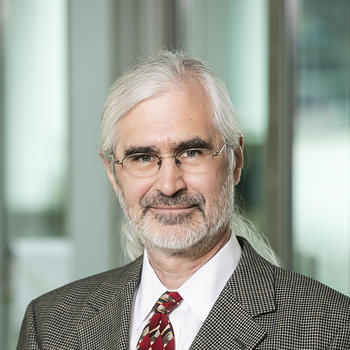In This Story

On April 2, 2025, United States President Donald Trump stood in the White House Rose Garden and unveiled his trade policy: dramatically expanded tariffs on imports, a protectionist tax that requires American companies to pay a premium on imports. The market responded in panic. The stock market fell, entering a bear market until the White House announced a pause on the tariffs, pulling the economy out of a tailspin. This was all perfectly foreseeable—many economists warn that if these policies stay in place, American national power will wane. These critics, such as the Economist and researchers at the University of Pennsylvania, assert that despite promises of increased American affluence, Trump’s belief in protectionism is costing the nation.
Why then, would the Trump Administration pursue this path? George Mason University professor Kenneth Reinert from the Schar School of Policy and Government tackles the history and consequences of this ideology in the new paperback edition of The Lure of Economic Nationalism: Beyond Zero-Sum (Anthem Press).
“Originally, I wrote it as a commentary on an era that I thought would pass,” said Reinert, noting the book’s original release in 2023. “Unfortunately, I think the book’s relevance has increased rather than decreased over the last couple of years."
In the book, Reinert lays out the doctrine of economic nationalism, tracing its journey to modern ascendency. Economic nationalism is one of several nationalist ideologies, which exalt a loosely defined “us,” often bound by a shared history, culture, or language, against a loosely defined “them.”
“From an economic perspective, the nation needs to be protected against the outside world, against the global economy,” said Reinert. “For that nation, manufacturing and industry allegedly matter a great deal. This ideology is a retreat from multilateralism, and in developing and communicating this ideology, its proponents engage in what I call zero-sum thinking: that there is a fixed pie, and what one country gets, another country loses.”
Economic nationalism is not a new idea: originally referred to as mercantilism, the ideology has its origins in the imperialist motivations of the East India Trading Company. Reinert explains that the major thinker who has influenced Trump’s policies is Friedrich List, an early economist who advocated for national power through economic protectionism.
“Much of what List claimed was against the empirical evidence. If you look at protectionism in the 19th century, it did not support growth,” said Reinert. “List criticized Adam Smith for focusing on value added, the additional economic value created during the production process. However, it is value added that really matters, not manufacturing per se. Some manufacturing can be characterized by high value added, but this is not always the case. The current focus on protecting steel, protecting aluminum, protecting autos, all of this hearkens back to List’s notion of manufacturing power.”
List’s ideas map clearly onto the ideology promoted by Trump and his economic advisor Peter Navarro. They see global trade in a zero-sum manner, where the economy and trade are wielded as economic weapons. Under these ideas, by engaging in economic protectionism and rejecting international economic systems, America can dominate the world stage by asserting its national power.
“Unfortunately, from the point of view of mainstream economics, almost all of it is misguided,” said Reinert. “It violates basic economic processes that don’t suddenly disappear. I would say economic nationalism is self-defeating, particularly in the long run.”
Trump’s policies during his first term bear this out: despite a stated desire to reduce the trade deficit, the deficit increased under these policies. Manufacturing did not return to American shores. America’s retreat from the World Trade Organization, an organization that the United States built after World War II for its own benefit, has empowered China. Further, trade economists have outlined ways to more effectively confront China by cooperating with other countries and leveraging WTO agreements.
“The United States needs export markets,” said Reinert. “If you are a U.S. farmer, you need export markets. And export markets are not going to be there for you with an economic nationalist approach. The U.S. soybean sector lost the Chinese market during the first Trump administration. Brazil is supplying that now. If you are in manufacturing, you need export markets. You also need relatively stable input prices, and by placing very high tariffs on all metal products coming into the United States you radically increase the cost of manufacturing in the United States. U.S. manufacturing competitiveness depends on the multilateral system.”
Reinert instead promotes a return to multilateralism and the economic establishment that the United States itself built after WWII. Economic protectionism cannot support the United States in our interconnected era—the time for mercantilism is long past.
“Now, yes, China has been an issue, but there are multiple ways that can be addressed through the World Trade Organization,” said Reinert. “They are not perfect and there need to be changes made at the WTO, but the United States built a dispute settlement system to its own specifications in the World Trade Organization. The United States needs to re-engage with the WTO and wield the weapon that it designed.”
The Lure of Economic Nationalism posits that while the simple narratives of populist economic thinking are seductive, they are ultimately self-defeating. When bundled under an ethnonationalist ideology, these policies can be catastrophic. As Reinert demonstrates both in his book and his courses as director of the Schar School’s Global Commerce and Policy program, the world is now irrevocably interconnected, and protectionist economic ideologies cannot move us forward productively.
